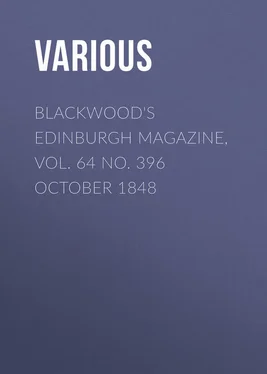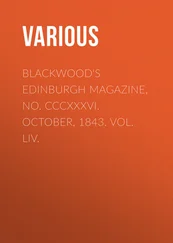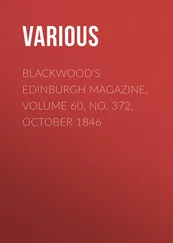Various - Blackwood's Edinburgh Magazine, Vol. 64 No. 396 October 1848
Здесь есть возможность читать онлайн «Various - Blackwood's Edinburgh Magazine, Vol. 64 No. 396 October 1848» — ознакомительный отрывок электронной книги совершенно бесплатно, а после прочтения отрывка купить полную версию. В некоторых случаях можно слушать аудио, скачать через торрент в формате fb2 и присутствует краткое содержание. Издательство: Иностранный паблик, Жанр: periodic, foreign_edu, Путешествия и география, на английском языке. Описание произведения, (предисловие) а так же отзывы посетителей доступны на портале библиотеки ЛибКат.
- Название:Blackwood's Edinburgh Magazine, Vol. 64 No. 396 October 1848
- Автор:
- Издательство:Иностранный паблик
- Жанр:
- Год:неизвестен
- ISBN:нет данных
- Рейтинг книги:4 / 5. Голосов: 1
-
Избранное:Добавить в избранное
- Отзывы:
-
Ваша оценка:
- 80
- 1
- 2
- 3
- 4
- 5
Blackwood's Edinburgh Magazine, Vol. 64 No. 396 October 1848: краткое содержание, описание и аннотация
Предлагаем к чтению аннотацию, описание, краткое содержание или предисловие (зависит от того, что написал сам автор книги «Blackwood's Edinburgh Magazine, Vol. 64 No. 396 October 1848»). Если вы не нашли необходимую информацию о книге — напишите в комментариях, мы постараемся отыскать её.
Blackwood's Edinburgh Magazine, Vol. 64 No. 396 October 1848 — читать онлайн ознакомительный отрывок
Ниже представлен текст книги, разбитый по страницам. Система сохранения места последней прочитанной страницы, позволяет с удобством читать онлайн бесплатно книгу «Blackwood's Edinburgh Magazine, Vol. 64 No. 396 October 1848», без необходимости каждый раз заново искать на чём Вы остановились. Поставьте закладку, и сможете в любой момент перейти на страницу, на которой закончили чтение.
Интервал:
Закладка:
"I know not how it was," continued my father, "but Lord Rainsforth turned the conversation on Ellinor. After speaking of his expectations from his son, who was returning home, he said 'But he will of course enter public life, – will, I trust, soon marry, have a separate establishment, and I shall see but little of him. My Ellinor! – I cannot bear the thought of parting wholly with her. And that, to say the selfish truth, is one reason why I have never wished her to marry a rich man, and so leave me for ever. I could hope that she will give herself to one who may be contented to reside at least a great part of the year with me – who may bless me with another son, not steal from me a daughter. I do not mean that he should waste his life in the country; his occupations would probably lead him to London. I care not where my house is, all I want is to keep my home . You know' (he added, with a smile that I thought meaning,) 'how often I have implied to you that I have no vulgar ambition for Ellinor. Her portion must be very small, for my estate is strictly entailed, and I have lived too much up to my income all my life to hope to save much now. But her tastes do not require expense; and while I live, at least, there need be no change. She can only prefer a man whose talents, congenial to hers, will win their own career, and ere I die that career may be made.' Lord Rainsforth paused, and then – how, in what words I know not, – but out all burst! – my long-suppressed, timid, anxious, doubtful, fearful love. The strange energy it had given to a nature till then so retiring and calm! My recent devotion to the law, – my confidence that, with such a prize, I could succeed, – it was but a transfer of labour from one study to another. Labour could conquer all things, and custom sweeten them in the conquest. The bar was a less brilliant career than the senate. But the first aim of the poor man should be independence. In short, Pisistratus, wretched egotist that I was, I forgot Roland in that moment; and I spoke as one who felt his life was in his words.
"Lord Rainsforth looked at me, when I had done, with a countenance full of affection – but it was not cheerful.
"'My dear Caxton,' said he, tremulously, 'I own that I once wished this – wished it from the hour I knew you; but why did you so long – I never suspected that – nor I am sure did Ellinor.' He stopped short, and added quickly – 'However, go and speak, as you have spoken to me, to Ellinor. Go, it may not yet be too late. And yet – but go.'
"Too late – what meant those words? Lord Rainsforth had turned hastily down another walk, and left me alone, to ponder over an answer which concealed a riddle. Slowly I took my way towards the house, and sought Lady Ellinor, half hoping, half dreading, to find her alone. There was a little room communicating with a conservatory, where she usually sat in the morning. Thither I took my course.
"That room, I see it still! – the walls covered with pictures from her own hand, many were sketches of the haunts we had visited together – the simple ornaments, womanly but not effeminate – the very books on the table that had been made familiar by dear associations. Yes, there the Tasso in which we had read together the episode of Clorinda – there the Æschylus in which I translated to her the Prometheus . Pedantries these might seem to some: pedantries, perhaps, they were; but they were proofs of that congeniality which had knit the man of books to the daughter of the world. That room – it was the home of my heart! Such, in my vanity of spirit, methought would be the air round a home to come. I looked about me, troubled and confused, and, halting timidly, I saw Ellinor before me, leaning her face on her hand, her cheek more flushed than usual, and tears in her eyes. I approached in silence, and as I drew my chair to the table, my eye fell on a glove on the floor. It was a man's glove. Do you know," said my father, "that once, when I was very young, I saw a Dutch picture called The Glove, and the subject was of murder. There was a weed-grown marshy pool, a desolate dismal landscape, that of itself inspired thoughts of ill deeds and terror. And two men, as if walking by chance, came to this pool, the finger of one pointed to a blood-stained glove, and the eyes of both were fixed on each other, as if there were no need of words. That glove told its tale! The picture had long haunted me in my boyhood, but it never gave me so uneasy and fearful a feeling as did that real glove upon the floor. Why? My dear Pisistratus, the theory of forebodings involves one of those questions on which we may ask 'why' for ever. More chilled than I had been in speaking to her father, I took heart at last and spoke to Ellinor" —
My father stopped short; the moon had risen, and was shining full into the room and on his face. And by that light the face was changed; young emotions had brought back youth – my father looked a young man. But what pain was there! If the memory alone could raise what, after all, was but the ghost of suffering, what had been its living reality! Involuntarily I seized his hand: my father pressed it convulsively, and said, with a deep breath, "It was too late; Trevanion was Lady Ellinor's accepted, plighted, happy lover. My dear Katherine, I do not envy him now; look up, sweet wife, look up!"
CHAPTER XXXIII
"Ellinor (let me do her justice) was shocked at my silent emotion. No human lip could utter more tender sympathy, more noble self-reproach; but that was no balm to my wound. So I left the house – so I never returned to the law – so all impetus, all motive for exertion, seemed taken from my being – so I went back into books. And so, a moping, despondent, worthless mourner might I have been to the end of my days, but that heaven, in its mercy, sent thy mother, Pisistratus, across my path; and day and night I bless God and her, for I have been, and am – oh, indeed, I am, a happy man!"
My mother threw herself on my father's breast, sobbing violently, and then turned from the room without a word, – my father's eye, swimming in tears, followed her; and then, after pacing the room for some moments in silence, he came up to me, and leaning his arm on my shoulder, whispered, "Can you guess why I have now told you all this, my son?"
"Yes, partly: thank you, father," I faltered, and sate down, for I felt faint.
"Some sons," said my father, seating himself beside me, "would find in their father's follies and errors an excuse for their own: not so will you, Pisistratus."
"I see no folly, no error, sir – only nature and sorrow."
"Pause, ere you thus think," said my father. "Great was the folly, and great the error of indulging imagination that had no basis – of linking the whole usefulness of my life to the will of a human creature like myself. Heaven did not design the passion of love to be this tyrant; nor is it so with the mass and multitude of human life. We dreamers, solitary students like me, or half poets like poor Roland, make our own disease. How many years, even after I had regained serenity, as your mother gave me a home long not appreciated, have I wasted. The main-spring of my existence was snapped – I took no note of time. And therefore now, you see, late in life the Nemesis wakes. I look back with regret at powers neglected, opportunities gone. Galvanically I brace up energies half palsied by disuse, and you see me, rather than rest quiet and good for nothing, talked into what, I dare say, are sad follies, by an Uncle Jack! And now I behold Ellinor again; and I say, in wonder, All this – all this – all this agony, all this torpor for that haggard face, that worldly spirit! So is it ever in life. Mortal things fade; immortal things spring more freshly with every step to the tomb.
Читать дальшеИнтервал:
Закладка:
Похожие книги на «Blackwood's Edinburgh Magazine, Vol. 64 No. 396 October 1848»
Представляем Вашему вниманию похожие книги на «Blackwood's Edinburgh Magazine, Vol. 64 No. 396 October 1848» списком для выбора. Мы отобрали схожую по названию и смыслу литературу в надежде предоставить читателям больше вариантов отыскать новые, интересные, ещё непрочитанные произведения.
Обсуждение, отзывы о книге «Blackwood's Edinburgh Magazine, Vol. 64 No. 396 October 1848» и просто собственные мнения читателей. Оставьте ваши комментарии, напишите, что Вы думаете о произведении, его смысле или главных героях. Укажите что конкретно понравилось, а что нет, и почему Вы так считаете.












